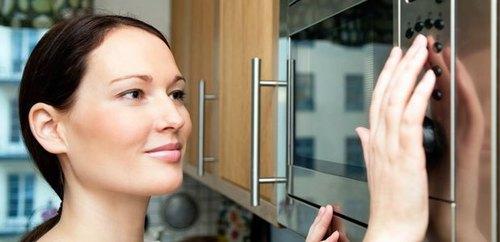5 Myths And Facts About Microwaving Food

Does nuking your meal make it less nutritious? You may be surprised. (Photo: Getty Images)
Did you see American Hustle? Remember that scene where Jennifer Lawrence’s hilarious, mouthy character Roslyn almost burns down the house by putting a meal in the microwave that’s covered with tin foil? In a fit of anger, she tells her husband, Irv, (played by Christian Bale) that he never should have brought that thing in her house anyway — since microwaves make food less nutritious.
That’s not true of course. (In fact, in case you missed it, the movie’s claim even resulted in a lawsuit last year.) But it is a fact that microwave cooking has sparked a number of myths since the “space oven’s” creation. Read up on the most common microwave myths, and which ones are legit.
Related: 9 Everyday Sources of Radiation
Myth: Microwaving food is a danger to nutrients
Nope, you shouldn’t be overly concerned about microwaves messing with nutrients. “There is no specific harm of microwaving with regard to nutrient levels,” says David Katz, MD, director of Yale University’s Prevention Research Center. In fact, any type of cooking can chemically change a food and it’s nutrient content: Vitamin C, omega-3 fats, and some bioflavanoid antioxidants are more sensitive to heat in general, Dr. Katz says. Nutrients from veggies can also leach into cooking water. Since you’re apt to use less water when cooking in a microwave, your food might even be better off.
Nope, you shouldn’t be overly concerned about microwaves messing with nutrients. “There is no specific harm of microwaving with regard to nutrient levels,” says David Katz, MD, director of Yale University’s Prevention Research Center. In fact, any type of cooking can chemically change a food and it’s nutrient content: Vitamin C, omega-3 fats, and some bioflavanoid antioxidants are more sensitive to heat in general, Dr. Katz says. Nutrients from veggies can also leach into cooking water. Since you’re apt to use less water when cooking in a microwave, your food might even be better off.
Related: The 20 Best Foods to Eat for Breakfast
Fact: You should be careful with plastics
Microwaving plastics is definitely a no-no because it can lead to the containers breaking down and allowing more chemicals like BPA and phthalates to leach into your food. Many companies today make BPA-free and “microwave safe” containers. However, in a 2011 study in Environmental Health Perspectives, researchers tested 455 plastic products, from baby bottles to food containers, and found nearly all of them still leached estrogenic chemicals, which have been linked to obesity and some forms of cancer. Even plastics marketed as BPA-free were guilty. The ubiquity of plastics makes it hard to avoid them completely. But the best advice is to avoid them when you can, and always transfer food to a glass or ceramic dish before microwaving, Dr. Katz says.
Related: 27 Mistakes Healthy People Make
Myth: Reheating pasta can make it healthier (for now, at least)
A recent experiment on the BBC investigative health program Trust Me, I’m a Doctor sparked buzz after finding that when pasta was cooked, cooled, then reheated in a microwave, it reduced participants’ post-meal rise in blood glucose by 50%. The reason, researchers said, is that pasta that’s cooled and reheated acts like resistant starch, preventing the gut from breaking down carbs and absorbing them as sugar. But don’t get too excited. That was one study including a measly nine volunteers, so Dr. Katz says to take it with a grain of salt for now. His advice: stick with whole-grain pasta instead, which experts know is healthier. (Due to the higher fiber content, blood sugar does not spike as quickly as it does after eating refined pasta.) “For sure, whole-grain pasta has a lower glycemic effect than refined pasta, whether or not it is reheated,” he says.
A recent experiment on the BBC investigative health program Trust Me, I’m a Doctor sparked buzz after finding that when pasta was cooked, cooled, then reheated in a microwave, it reduced participants’ post-meal rise in blood glucose by 50%. The reason, researchers said, is that pasta that’s cooled and reheated acts like resistant starch, preventing the gut from breaking down carbs and absorbing them as sugar. But don’t get too excited. That was one study including a measly nine volunteers, so Dr. Katz says to take it with a grain of salt for now. His advice: stick with whole-grain pasta instead, which experts know is healthier. (Due to the higher fiber content, blood sugar does not spike as quickly as it does after eating refined pasta.) “For sure, whole-grain pasta has a lower glycemic effect than refined pasta, whether or not it is reheated,” he says.
No comments:
Post a Comment